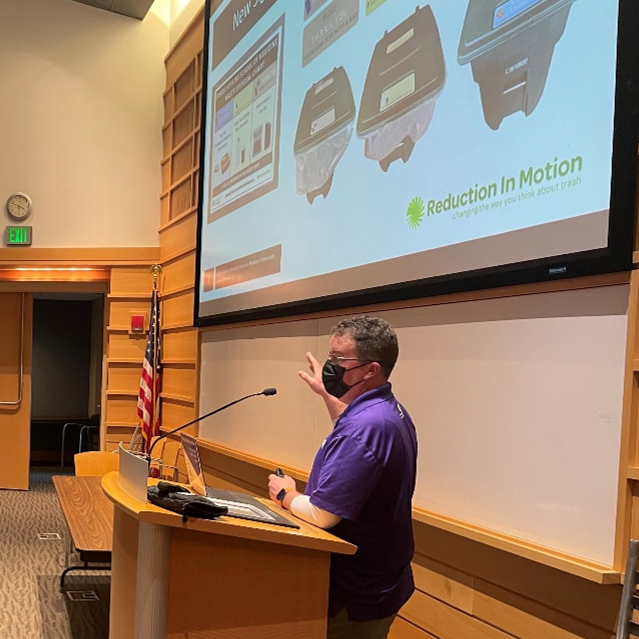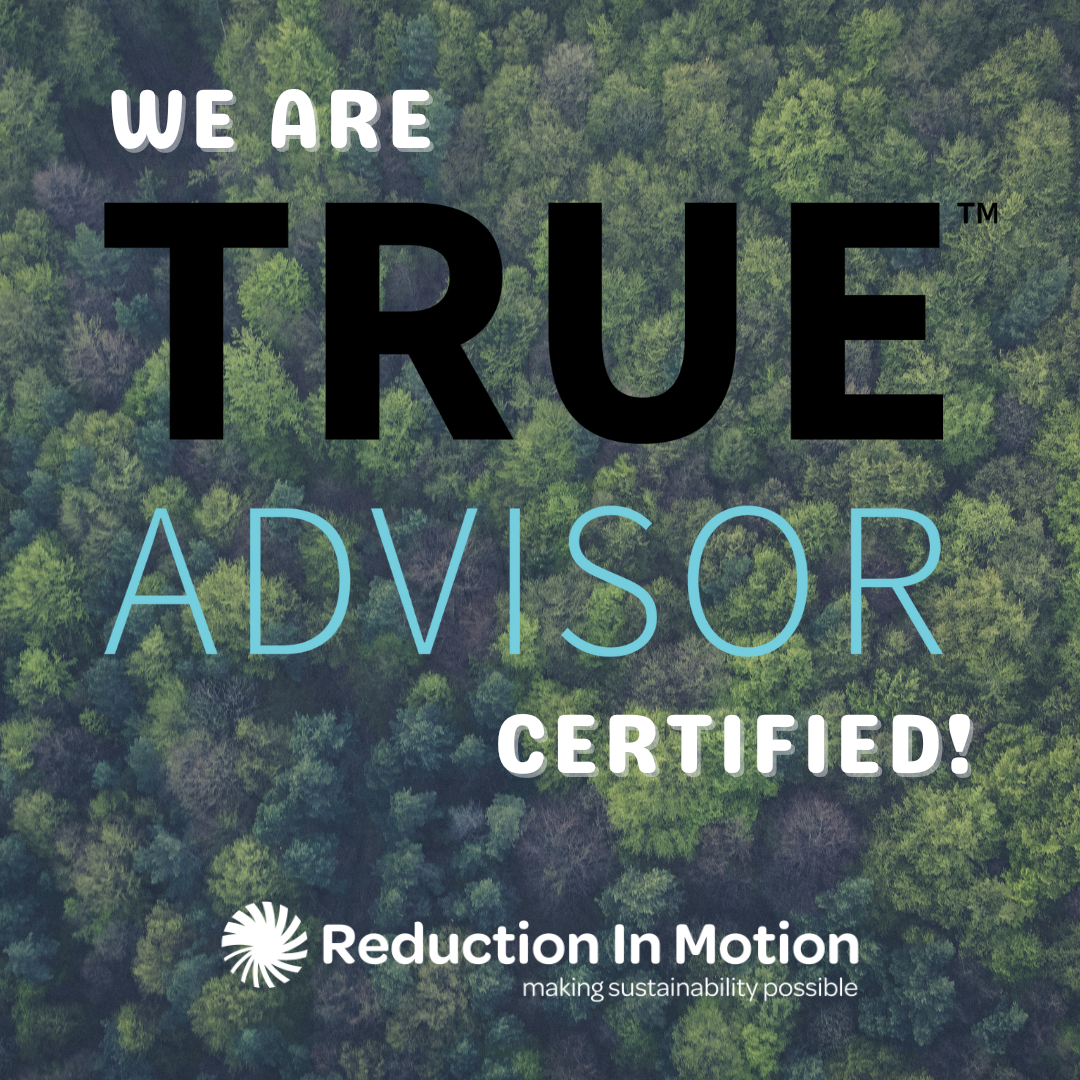What We Do at Reduction in Motion
The Role of a Sustainability Consultant
Sustainability is one of the primary issues — perhaps the most crucial one — of our times. At Reduction In Motion, we specialize in one aspect of sustainability: strategically developing the most efficient and effective programs for dealing with the disposal of that ever-present fact of modern life, trash.
Since the 1960s, there has been a steady and broadening realization that disposing of the fruits of modern industrial production is an issue crucial to humanity’s future. Modern society produces a great many “things,” more today than any other time in our history. But disposing of these things when it’s time for them to be discarded is a systems-output issue that humanity is still struggling with (ultimately, the buildup of greenhouse gases in the Earth’s atmosphere is such a sustainability issue).
But, more plainly, the bottom-line costs associated with the disposal of refuse continue to rise. This is in large part because over the last few decades the long-term impacts of landfills on the environment have been realized and new landfills are far more expensive to build and operate — and much more efficient and clean — than was the historical norm.
Getting rid of trash costs more than it used to. What’s the simplest way to curtail that cost, both environmentally and monetarily? It’s simple: cut down on the amount of refuse destined for the landfill.
That’s where we come in. As waste disposal mitigation experts, we can develop and implement plans for waste diversion, handling, and reduction. We do this by implementing procedures for program evaluation, implementation, monitoring, tracking, and reevaluation.
What We Can Do For You

If your management team has come to the realization that being a more sustainable business is in your company’s best interests, the next step is gleaning the know-how necessary to make it happen.
But that’s not as easy as it sounds. Your company doesn’t specialize in waste management. You specialize in what you do. But we specialize in systematic waste management. We will partner with you and provide the savvy and knowledge base to help you implement effective systematic change at your facility or facilities.
The implementation of a company-wide recycling program is usually the initial and most public manifestation of the sustainability concept being integrated into the operations of a business. It’s a big step and it’s always good to make a good first impression.
We’ll bring your key decision makers together and create a positive environment for communication, providing not only technical expertise but also introducing an outsider’s “eye” to your established routines. The fact is established routines oftentimes include waste and inefficiencies that are not noticed because, well, let’s face it, they’ve become routine.
Likewise, even if your company has already begun meeting the challenges of sustainability, our outsider’s eye may spot something you didn’t see. Maybe you don’t need to build a system from the ground up but could use our analytical expertise to improve your existing programs. Reduction In Motion is more than happy to come in as consultants to examine and fine-tune your already operative sustainability programs and become an extension of your internal operations team.
What we do is sustainability consulting. Among other things, we help you cut down on the amount of waste you’re paying to dispose of. Let’s chat!
Or give us a call at: (410) 877-1593
Our Process
Since 2002 we’ve been talking trash. We’ve learned a great deal from our clients along the way. We can share our experience and expertise with you. Whether you’re managing a small or large operation, if you are ready to embrace sustainability, then we can be your partner in creating systemic change that will reduce waste (and operating costs).
We will do this by working through our six-step process with you in a symbiotic, full partnership. It will result in an efficient, thorough waste management system for your operations.
Assessment
The first step is establishing an accurate and practical baseline. From this foundation of knowledge future programs and adaptations will be judged. This includes cases in which previously implemented sustainability programs are already up and running.
Although it’s sometimes tempting to cut the corner here, that should never happen. This crucial first step — the foundation that everything else will be built upon — not only establishes a data baseline but also is the first hard look with our fresh eye on your status quo. It’s a valuable exercise to see what jumps out at us when current systems are examined.
Also, this step will involve us showing up at your facility, putting on our rubber gloves, and literally digging through your trash. Always fun to watch.
We will systematically examine and document the following:
- Your current operating structure and which departments will be key players in any new or upgraded waste mitigation system. At this initial stage, we will begin laying the groundwork for buy-in by key elements throughout your organization.
- The performance of any programs that are already in place. We’ll watch them work, note their strengths and weaknesses, and begin mapping out how they could be incorporated into any newly developed waste mitigation system.
- What metrics are currently being tracked and whether they provide the level of understanding needed to implement a successful long-term program? If that is not happening, we’ll begin to develop better metrics.
- Whether there are realistic goals being pursued by your current program and whether those goals are widely understood throughout your organization. Do you need better goals or a better strategy to communicate them? Or both?
- Your current corporate culture and whether sustainability is fully understood and embraced by the workforce on-site.
Basically, we’ll park ourselves at your facility for a few days and take really good, thorough notes (did we mention we’ll literally dig through your garbage too). These deep observations are what we need to move onto the next step.
We help you cut down on the amount of waste you’re paying to dispose of. Let’s chat today!
Or give us a call at: (410) 877-1593
Documentation and Planning
After we’ve taken a good hard look at your operations — as they’re actually happening on the ground and not how they’re supposed to work in theory — we will document the current reality and develop broad recommendations to meet goals that we think are realistic to your situation.
Our recommendations will include:
- Sharing step-by-step plans that can meet the goals you’ve outlined to us and that we, in our best professional judgment, think are realistic. This will include alterations to current processes (if needed) and new approaches.
- New programs that we think make sense for you. We’ll create a plan overview with timelines, organizational lines of responsibility, action items, and other needed forward-thinking analysis that will be ready for approval, followed by implementation.
In close consultation with your management representatives, we will make a detailed plan for you. What you’ll get is realistic instructions on how to incorporate waste management and long-term sustainability practices into the daily operations of your facility.
Education
The fact is we will not be carrying out the plan we develop for you. We’ll design it, get it up and running, and monitor it for you. But it is your staff that will ultimately have to make it happen day in, day out. And it’s far more likely that they’ll succeed if the vibe isn’t that someone else’s plan is just being dropped in their laps.
As your partner in pursuing a sustainable path, we will:
- Engage with your staff, explaining respectfully (while incorporating their input) how the new system is expected to operate. We will also share why it is important not only to the bottom line of their employer but also how it is part of a broader attempt to normalize sustainability in our culture at large.
- Provide hands-on training at the operations level to help break old habits and build new ones. If significant changes are being made to current systems and new ones are being introduced, then the process of building up “muscle memory” needs to be introduced methodically and with forethought.
We will develop your plan with your input. That’s what we do as consultants. But ultimately your workforce will be carrying out that plan. The Education step is the transition point, where our plan begins transitioning into your operating procedure.
Deployment
When the day comes to fully deploy the new system, we’ll be there with you as your partner, smoothing out rough spots and keeping an eye on how the “flow” is taking hold throughout your operations.
We’ll make what we’ve designed work, including:
- During the initial period of implementation, having our staff onsite with yours as full partners.
- Depending on your staffing reality, we’ll pitch in with some of the initial grunt work, like installing new refuse-material bins and signage.
We won’t hand you a plan and walk away. We’ll be there on the ground with you when it first “goes live” and is implemented.
Support and Monitor
Once the excitement of the “new” has died down, we’ll continue to check-in with you and keep our fingers on the pulse of your new systems. We can do this remotely by analyzing the data that is being collected and will periodically make in-person visits to keep our “new eyes” on things.
We’ll be there to:
- Step in when you find there are issues arising that need to be addressed.
- Continue collecting data, which creates powerful decision-making and planning tools.
Like the initial assessment, this step is very important and sometimes easy to gloss over. But continuing the data collection process and comparing it with the detailed baseline will allow us to fine-tune and improve your waste mitigation system as it grows.
Evaluate
Finally, as various aspects of your waste mitigation program get switched over to “autopilot,” we’ll continue to keep an eye on things and focus on both the current details and the big picture of “what happens next?”
We will:
- Analyze and document what parts of the new program are working as designed, which areas may need tweaking, and what your staff is learning as they implement the program. Their feedback will be incorporated into design tweaks and future plans.
- Give updates on the big picture, exploring whether the trend is in the right direction and if you’re achieving your cost-saving and zero-waste goals.
As efficiency goals in your current program are met, we’ll help you plan for adding other waste streams to your mitigation portfolio or maybe find new challenges to consider, such as environmental-preferable purchasing.
Conclusion
Again, sustainability is a huge challenge facing humanity at large and individual companies looking to control costs. It is a big, complicated sector of the modern economy.
Like legal issues, advertising, and financial auditing, it is an area where bringing in experienced professionals from outside your organization is a wise move. We know this sector and have business connections within it. By bringing Reduction In Motion in as a sustainability consultant, you’re not only making a wise business decision but also laying the groundwork for being a better corporate citizen.
What we do is sustainability consulting. Among other things, we help you cut down on the amount of waste you’re paying to dispose of. Let’s chat!
Or give us a call at: (410) 877-1593

Our team of sustainability and waste consultants work together to develop content for our site. Contact us to learn more about something we’ve written about or would like us to focus on in the future.


